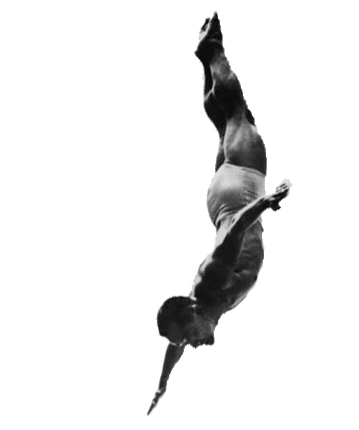OLYMPIC DIVING
Diving was first introduced in the official programme of the Summer Olympic Games at the 1904 Games of St. Louis and has been an Olympic sport since.
It was known as "fancy diving" for the acrobatic stunts performed by divers during the dive (such as somersaults and twists).
This discipline of Aquatics, along with swimming, synchronized swimming and water polo, is regulated and supervised by the International Swimming Federation (FINA), the federation (IF) for aquatic sports.
The first Olympic diving events were contested by men and consisted of a platform diving event ("fancy high diving") and also a plunge for distance event, which heralded victorious the diver who could reach the farthest underwater, while remaining motionless after a ground-level standing dive.
At the 1908 Summer Olympics, men's springboard diving was added to the programme replacing the plunge for distance, regarded as uninteresting. Women's diving debut happened at the 1912 Summer Olympics in the platform event and was expanded to springboard diving at the 1920 Summer Olympics.
A parallel platform diving event for men, called "plain high diving", was presented at the Games of the V Olympiad. No acrobatic moves were allowed, only a simple straight dive off the platform. It was last contested at the 1924 Summer Olympics after which it was merged with "fancy high diving" into one competition renamed "highboard diving" (or just "high diving
By the time of the 1996 Summer Olympics, the diving events were exactly the same as in 1928. However, four years later in Sydney, the inclusion of a synchronized diving variant for the springboard and platform events elevated the list up to eight events.
Another important change to the sport occurred in the 1984 Summer Olympics, when China was first allowed to compete, ending the ban imposed upon them by FINA because of their nation's government. China has won many medals since then.

Jennifer
Abel
Émilie
Heymans
Heike
Fischer
Ditte
Kotzian
Chantelle
Newbery
Irina
Lashko
Olena
Zhupina
Ganna
Sorokina
Fu
Mingxia
Yuliya
Pakhalina
Anastasia
Pozdniakova
Chen
Ruolin
Wang
Hao
Sang
Xue
Li
Ting
Lao
Lishi
99 DIVERS
Guo
Jingjing
Gao
Min
Wu
Mingxia
Vera
Ilyina
Kelci
Bryant
Abigail
Johnston
He
Zi
Laura
Wilkinson
Luo
Yutong
Qin
Kai
Wang
Feng
Thomas
Bimis
Nikolaos
Siranidis
Xiao
Hailiang
Xiong
Ni
Cao
Yuan
Zhang
Yanquan
Huo
Liang
Lin
Yue
Yang
Jinghui
Tian
Liang
Dmitri
Sautin
Igor
Lukashin
Ilya
Zakharov
He
Chong
Peng
Bo
Mark
Lenzi
David
Boudia
Matthew
Mitcham
Hu
Jia
Evgeny
Kuznetsov
Yuriy
Kunakov
Tobias
Schellenberg
Andreas
Wels
Aleksandr
Dobroskok
Brittany
Broben
Émilie
Heymans
Annika
Walter
Yelena
Miroshina
Irina
Lashko
Briony
Cole
Iván
García
Germán
Sánchez
Sascha
Klein
Patrick
Hausding
Peter
Waterfield
Leon
Taylor
Alexandre
Despatie
Fernando
Platas
Tan
Liangde
Yu
Zhuocheng
Jan
Hempel
Mathew
Helm
Zhou
Lüxin
Tom
Daley
FACT
In individual events dives are marked from one to 10 by seven judges. The highest and lowest marks are discounted before the sum of the remaining five is multiplied by the degree of difficulty then by 0.6.
Gleb
Galperin
Heiko
Meyer
Gleb
Galperin
Dmitriy
Dobroskok
David
Boudia
Nicholas
McCrory
Dean
Pullar
Illya
Kvasha
Oleksiy
Prygorov
Paola
Espinosa
Tatiana
Ortiz
Meaghan
Benfeito
Roseline
Filion
Dörte
Lindner
Annie
Pelletier
Qiu
Bo
Falk
Hoffmann
Klaus
Dibiasi
Aleksandr
Portnov
Albert
White
Martina
Jäschke
Zhou
Jihong
Irina
Kalinina
Sylvie
Bernier
Bob
Webster
Joaquín
Capilla
FACT